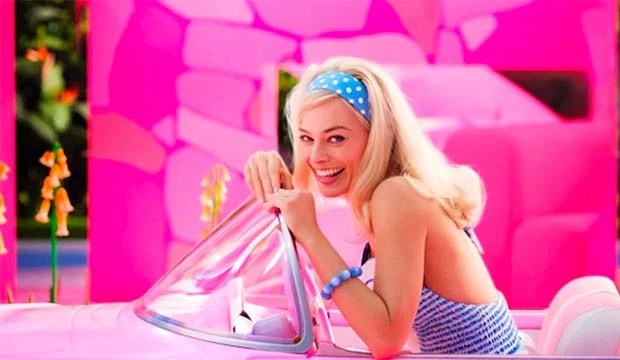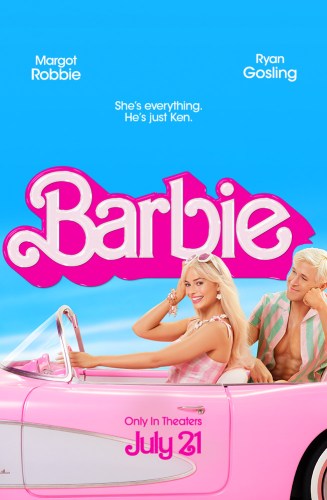Movie Review | Dollhouse of Cards
Arthouse Meets Popcorn in Greta Gerwig’s Bedazzling 'Barbie'

Arthouse Meets Popcorn in Greta Gerwig’s Bedazzling 'Barbie'

Greta Gerwig, already a heroine in the film realm — both in front of and behind the camera — has pulled off a special sort of miracle in Barbie Land and “the Real World.” As director, co-writer (with partner Noah Baumbach) and all-purpose mastermind behind the phenomenal Barbie, Gerwig has concocted what is most likely this year’s prime example of an “art film meets popcorn movie” spectacular.
Spinning off an idea proposed to her by the stunning Barbie star Margot Robbie, Gerwig has handily achieved her stated goal of creating a movie satisfying to the various audience demographics of those who love, hate or are coolly ambivalent about the Barbie Nation. Candy-colored, gravity-liberated irony meets earnest emotionality and feminist agendas in this multi-layered thinking person’s summer blockbuster.
In effect, Gerwig and clan have upended the culturally monolithic Barbie doll phenom, aptly introduced in a wild prelude with a 2001: A Space Odyssey-esque monolith sequence. We are plunged into the surreal fantasy domain of Barbieland, somewhere between live action, animation, and confectionary décor. Barbies live in their dreamhouses and exude a clean-toothy and cult-like good cheer: “hi Barbie,” “hi, Barbie,” is the communal mantra, until Robbie’s Barbie suddenly ponders death. It’s a pivotal moment in the tale, a memento mori knife twist which sets the deeper story of discovery in motion.

And then there is the Ken issue, embodied in the chameleonic feat of a performance by Ryan Gosling. Both Gosling and Robbie turn in performances at once heady and air-heady, as their once-robotic characters experience transformative shifts over the story’s course. Gosling starts out as a buff-bodied, numb-brained doll of a man, whose primary features are an ability to “beach” — as verb — and to pine for Barbie’s affections and presumably romantic reciprocation. This prospect is clearly complicated by their lack of genitalia.
In the clever workings of the premise, Gerwig dares to ask: what if the Barbies and Kens of the realm had the capacity of self-awareness and personal growth? As they bounce between the giddy, pinked-up dimension of “Barbie Land” and “the Real World,” Barbie and Ken transcend their Mattel-instilled, Stepford Wife-y blandness with both serious social commentary and meta-comical winking along the way.
For Barbie, the “wokeness” comes in the form of realizing the damage caused to ideas about body image and female self-determination by the idealized, sexualized Barbie archetypes. For Ken, contact with the male-dominated, testosterone-driven patriarchy — with horse imagery galore — opens up new channels of male entitlement, an attitude he brings back to infect the suddenly more dude-oriented Barbieland. The war between men and women, doll division, is on.
A scene with the Kens serenading their “ladies” — playing a cheesy arena ballad “at” them on the beach — is, alone, worth the price of admission. But a subversive plot is afoot to even the gender playing field.
Self-awareness takes on a loony existential dimension in the film, epitomized in the scene in which Gosling’s Ken is overcome by an epiphany: “Ken is me, Ken is me …” he chants, as if in a trance of awakening. Barbie becomes all too aware of the mighty, God-like (Old Testament God-like) powers of the “mothership” Mattel (run by males, natch, with Will Ferrell at the top). In another God-like twist, the actual Barbie inventor, Ruth Handler (played by Rhea Perlman), is gamely given her due spotlight.
In this tale, Barbie, the doll, keeps bumping into elements of human vulnerability. “I can’t do brain surgery,” Barbie laments, contrary to any reflexive “women can do whatever they set their mind to” philosophy. “I’m not good enough to do anything.” Of course, her very realization is a sign of a shift into self-improvement action.
Tucked cleverly into the sly comedy brew of Barbie are more serious thematic moments, as when the “real world” mother and Mattel employee played by America Ferrara delivers a powerful soliloquy about the perils of patriarchy and the importance of female empowerment. That ain’t Malibu Barbie talking, in her convertible on the way to her sexless dreamhouse. In short, the verdict on Gerwig’s masterful Barbie: it’s complicated.
Please note this login is to submit events or press releases. Use this page here to login for your Independent subscription
Not a member? Sign up here.
You must be logged in to post a comment.